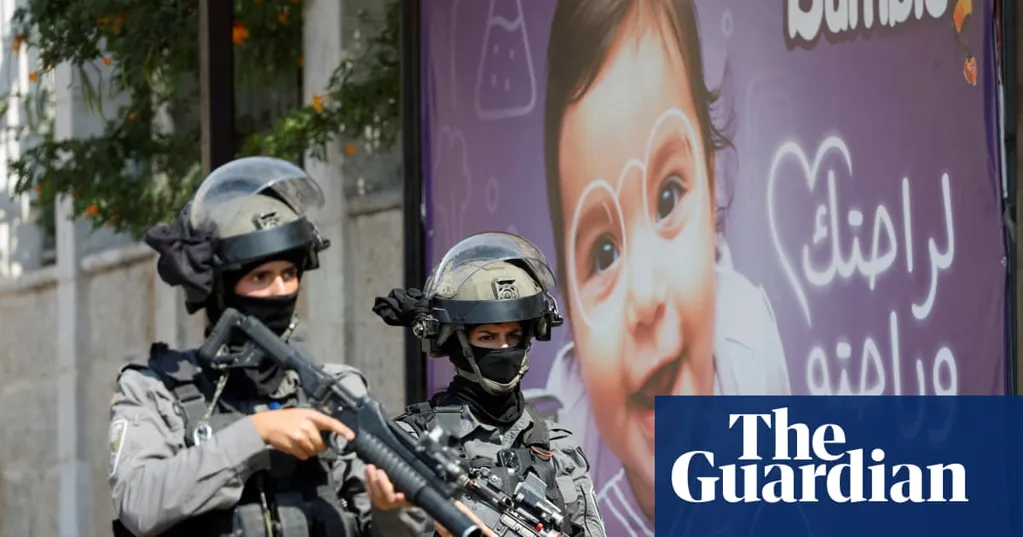Abu Said, a barber, is busy. It is a weekend and though the narrow streets of al-Am'ari camp are hot and quiet, his shop is crowded.
Everyone in al-Am'ari, on the outskirts of Ramallah in the occupied West Bank, knows that the UK, France, Portugal and Canada have said they will recognise a Palestinian state imminently, following formal recognition of Palestine by more than 140 other countries.
"It is perfect. Even if it is very late coming, it means they have recognised the rights of the Palestinian people," said Abu Said, who did not give his full name for fear of harassment or detention by Israel's security forces.
But although there is universal welcome for the move, there are significant reservations, too.
Abu Said said: "It is not enough to recognise in itself. We need actions and implementation. The Palestinian people have suffered a lot and many promises were made and broken over 77 years."
At the nearby Che Guevara Cafe, Mohamed Rizk, a librarian, said he was angered by the British decision, to be formally announced on Sunday, which he described as "symbolic only".
"What are the borders of the state they are recognising? Does anyone know? Has anyone said? It is only to pacify us," he said. "At the end of the day, the US will veto anything anyway."
The walls of the cafe are decorated with images of iconic Palestinian figures such as Yasser Arafat, who led the Palestine Liberation Organisation for decades and co-founded Fatah, now the ruling party of the Palestinian Authority, which is based in Ramallah and exercises part authority over some of the occupied West Bank.
On another wall are pictures of Palestinian refugees from the period of the wars surrounding the foundation of Israel in 1948. Many of the original inhabitants of al-Am'ari camp were expelled from the central city of Lydda, or Lod, lived under Jordanian authority until the war of 1967, and then under Israeli military occupation.
The camp, now a maze of concrete tenements, is a bastion of support for Fatah. Walls have been painted with graffiti to welcome prisoners home from Israeli jails during the two ceasefires in the current Gaza conflict. Many residents were critical of the Hamas raid into Israel on 7 October 2023, which killed 1,200 people, mostly civilians, and led to 250 hostages taken to Gaza. The ensuing Israeli offensive has so far killed more than 65,000 people, mostly civilians, and devastated the territory.
On a third wall was a big screen showing images of the aftermath of the latest Israeli airstrikes in Gaza City, broadcast by Al Jazeera.
"Are Britain and France and the others going to impose arms embargos? Get food to Gaza? Start treating Netanyahu like they treat Putin?" Rizk said.
Nearby, Umm Karim, a 40-year-old lab technician, was parking her car on a potholed sidestreet. She too withheld her full name, and said the British declaration was "not enough".
"We need practical measures, like breaking off diplomatic relations, lots of sanctions or at least prosecution of any British citizens who fight in the Israeli army," she said.
In July, David Lammy, the then British foreign secretary, told the UN that the UK bore a special burden of responsibility to support the two-state solution given its history in the region: specifically, the Balfour declaration of 1917 favouring the establishment of a homeland for the Jewish people in Palestine.
"Our support for Israel, its right to exist and the security of its people is steadfast. However, the Balfour declaration came with the solemn promise 'that nothing shall be done, nothing which may prejudice the civil and religious rights' of the Palestinian people as well ... This has not been upheld and it is a historical injustice which continues to unfold," Lammy said.
Nour Odeh, an analyst and journalist from Ramallah, said Britain's historical role should never be ignored or overlooked.
"This is a debt, and it's never too late to do the right thing. But now to just give themselves a pat on the back and move on would be cynical and counterproductive. Recognition is a political and legal act and a commitment," she said.
One reason given for Britain's decision is the plan to accelerate Israeli settlements in the West Bank, which ministers fear will end any hope of a two-state solution. The French move is part of a broader diplomatic initiative.
Benjamin Netanyahu has accused France's president, Emmanuel Macron, of fuelling antisemitism by recognising Palestine and rewarding Hamas. "It is not diplomacy; it is appeasement. It rewards Hamas terror; hardens Hamas's refusal to free the hostages," the Israeli prime minister said.
Many Israelis and Palestinians point to the example of South Africa, where the apartheid regime was dismantled in part as a result of international censure and sanctions. "South Africa did not have a change of heart. They were compelled to make very realistic decisions to survive," said Odeh.
Diana Buttu, a Palestinian analyst and former peace negotiator based in Haifa, said the new recognitions of Palestine meant both "potential and fear".
"Now there is an opportunity to use this to push for an end to occupation ... The fear is that it is a way of evading responsibility," Buttu said.
[In which case], it would distract from Gaza and do nothing for the West Bank, where it is getting worse and worse on the ground, and there will be repercussions for the Palestinians. The tools are all there. There is just no political will."
In al-Am'ari, Abu Said listed the multiple efforts to resolve the conflict by diplomacy and by force during his lifetime. He compared the recent history of the Palestinians to his own 40 years as a barber.
"The customers come and go; the fashions change; everyone has a different idea of what to do; but at the end of the day I am still standing in my shop and nothing is very different."
